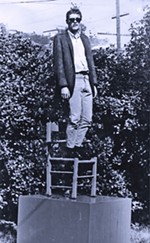10 Minutes With Jason Isbell
Three-show Moody Theater run begins tonight
By Doug Freeman, 11:00AM, Fri. Jul. 14, 2017
June’s The Nashville Sound continues a string of exceptional Jason Isbell albums beginning with 2013 breakout Southeastern. That pivotal turn reflects the equally dramatic change in his life: getting sober after years of hard-living with the Drive-By Truckers and marrying Amanda Shires, the Texas songwriter with whom he recently had his first child.
The struggles and joys of working back to focus, both personal and professional, have marked Isbell’s past three albums, including 2015’s double Grammy-winning Something More Than Free. He’s also steadily expanded his vision into broader cultural and social concerns still rooted in the intensely personal and poignant narratives of often marginalized characters.
Ahead of a three-night stand this weekend at the Moody Theater, Isbell spoke about his creative resurgence of the past five years, the pressures of success, and the decision to return with his band, the 400 Unit, for The Nashville Sound. The Mountain Goats open tonight’s show, and Amanda Shires kicks off both Saturday and Sunday.

Austin Chronicle: Both you and Amanda write incredibly personal songs, so how does that dynamic work between y’all, that expression of yourself and your relationship through music?
Jason Isbell: I’ve never really spent much time around people who didn’t do that, to tell you the truth. When you play music for a living and it’s as big a part of your life as it is mine, I’ve never really dated people that weren’t musicians or weren’t close to music in some way. Never even really had a lot of friends who weren’t close to music in some way.
I’m honestly not very interested in people who don’t express themselves that openly and that freely, so it’s really not a problem for us. I’ve discovered that if you live the right way, you don’t really mind your stories being told. And lately I’ve done my best to keep all those stories good ones.
I don’t really mind [Amanda] singing about our relationship. She’s a good songwriter, so I’m not scared of how it’s going to come out. I can see where it might be difficult for somebody that’s not used to it, but our whole lives have been surrounded by musicians and creative people, so that’s just how we live.
We don’t edit unless there’s a better way to say something. I wouldn’t come to her and say I don’t like this line, unless it was for the purposes of making it a better song rather than keeping my own privacy. What we’re doing is trying to be artists, and artists don’t really hide. Entertainers do a whole lot of hiding, but artists are the opposite.
AC: That brings up a question about how Nashville is changing, especially in Americana. Do you feel there’s a turning away from pure entertainment to something more artistic and substantial?
JI: Yeah, because there are more avenues now for people. You don’t have to sell millions of records to get your voice heard these days because of the changing landscape of the music business. It means that people aren’t going to make as much money as they used to make, and obviously that’s a bad thing on some level for a lot of people, but also it’s so cheap to make an album now and find distribution and get the album out online, so it’s causing the whole system to collapse.
I think that part of it is a good thing. I think the fact that major labels don’t have the kind of control they used to have over what kind of music people have access to is a good thing. People go for quality if you give them quality, and they’re going to go for shit if you give them shit, so if you give them good quality music, they’re going to respond to it. People crave good music and if it’s music with substance, then they’re going to consume it. If it isn’t, they’ll take whatever they can get.
I think the good thing now is that the keys are in the hands of people that make the music, for the most part, at least compared to how it was 10 or 15 years ago when if you didn’t have the support of a major record label, you weren’t allowed to participate.
AC: Do you feel there was a turning point for you creatively, especially with the last three albums? Was it sobriety?
JI: Yes, there definitely was. When I quit drinking, I wound up with a lot more focus and a lot more time to work, and that’s really made all the difference for me. I spent more time on each individual song, so the albums had more consistency, and the shows got a lot better because I had a lot more energy on tour. Everything just got better as far as that goes.
AC: What drove your decision to bring the 400 Unit back in on this album?
JI: After we’d already spent a bit of time recording, it became obvious to me that they had done a lot toward making this new album, and it wouldn’t be the same with anybody else playing those parts. So I really just wanted to give the credit for that. They had done a really good job and the arrangements were nice, so I wanted to make sure they got credit too.
AC: A lot has been made of you being this new voice of the South. Is that something you bristle against or embrace?
JI: To me, it doesn’t matter. The kind of job I have, people are going to put certain expectations on you if you have some success, and I don’t mind. I think I’m probably a pretty good role model at this point. I think most people, if they believe in what they’re saying, then they believe that they’re a good role model at heart. If you don’t think you’re a good role model, then you should probably change the way you’re behaving.
But for me, I don’t think about that when I’m doing my work. I just do the best work that I can and let all that other stuff just sort itself out. At the end of the day, I’m the person that has to live my life, and what’s really important to me is setting a good example for my family and being happy.
For me to be happy, I have to make good art. That’s something I figured out about myself a few years ago, and I’ve put a lot of work into the work that I do for me to be happy with it. That’s what keeps me motivated.
As far as responsibility to an audience or anything like that, I think I have an open-minded enough audience that wherever I want to go, I think they’ll at least give me the opportunity and listen with an open mind. I’m happy about that.
A note to readers: Bold and uncensored, The Austin Chronicle has been Austin’s independent news source for over 40 years, expressing the community’s political and environmental concerns and supporting its active cultural scene. Now more than ever, we need your support to continue supplying Austin with independent, free press. If real news is important to you, please consider making a donation of $5, $10 or whatever you can afford, to help keep our journalism on stands.
Kevin Curtin, April 28, 2022
Doug Freeman, July 15, 2017
April 22, 2024
April 19, 2024
Jason Isbell, Amanda Shires, Drive-By Truckers, 400 Unit, Mountain Goats, Willie Nelson









